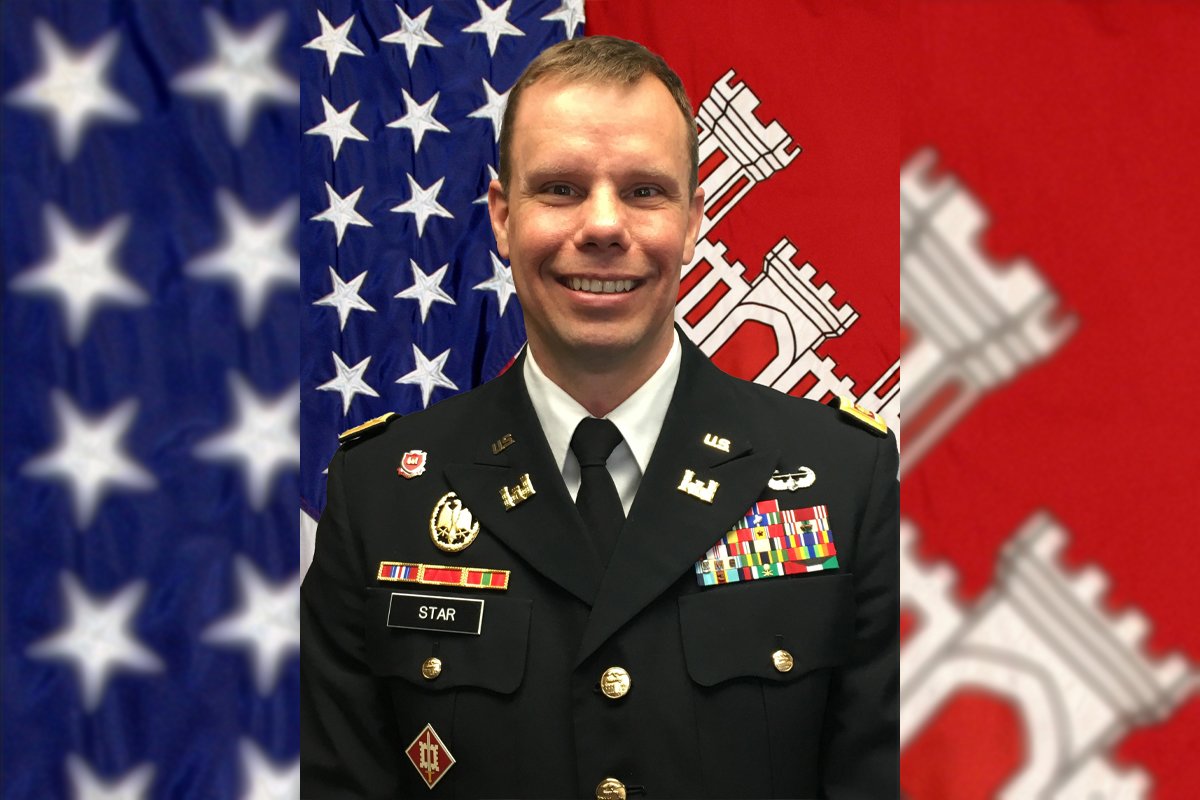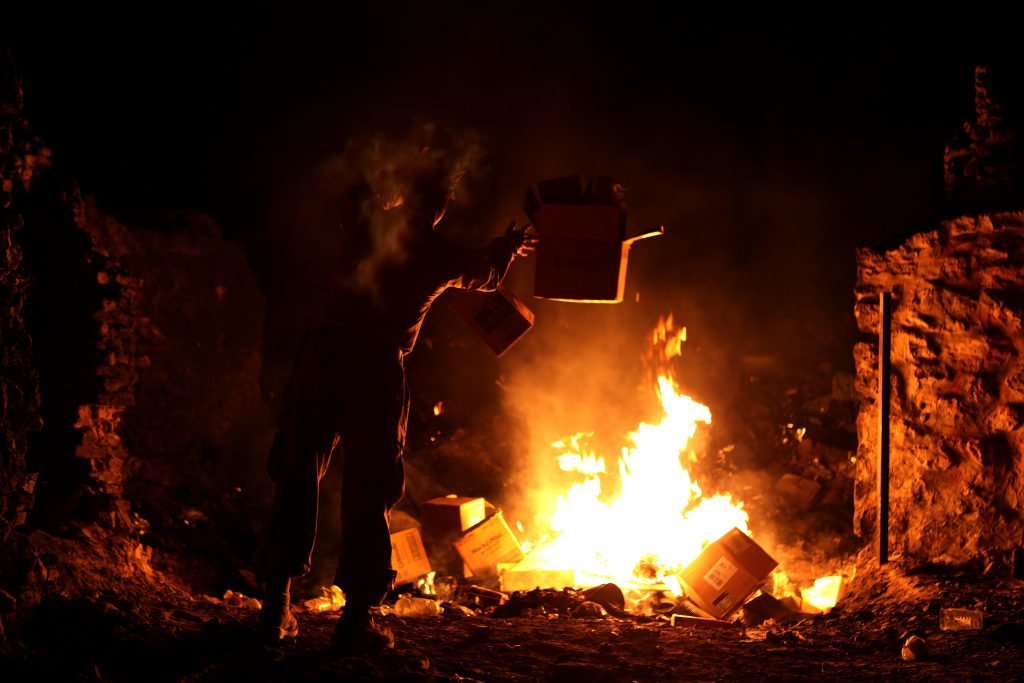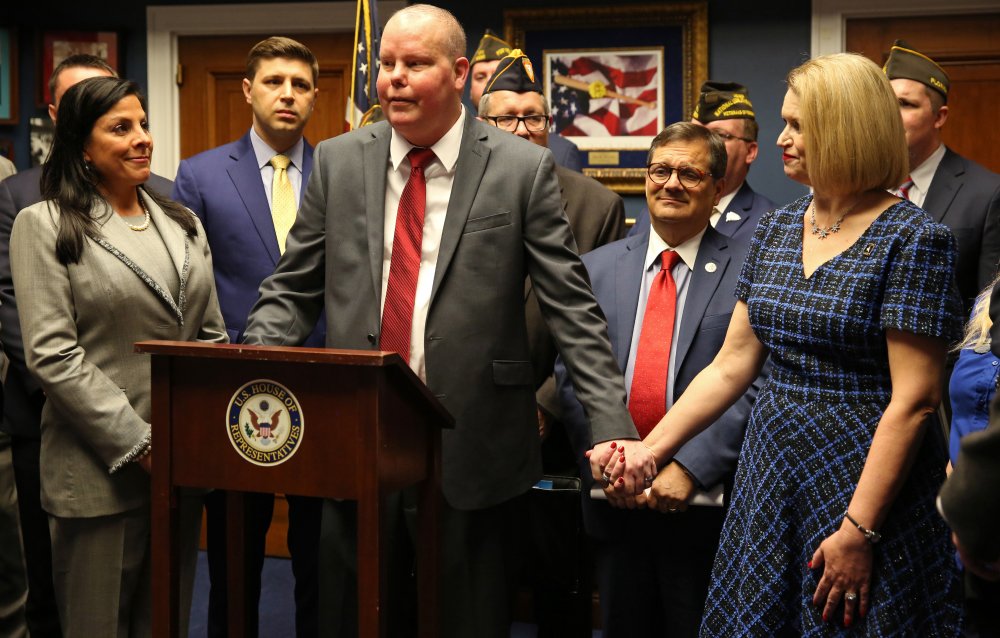Veteran with Lung Cancer From Burn Pits Seeks Changes to VA, DOD Benefits

Photo courtesy of the U.S. Army Corps of Engineers.
Major Richard Star loved to run. A U.S. Army reservist for 28 years and 10 months, Star served almost 15 of those years of active duty, starting with Operation Desert Storm.
“I just enjoyed running,” Star said. “And you breathe in deeply, obviously, and to choose some of the worst times to breathe in smoke — it was a bad idea, but I didn’t think so at the time. That was my primary level of exposure.”
Star was running past burn pits. On Memorial Day 2018, he collapsed and was diagnosed with terminal lung cancer. “The VA and the Army have all determined — it’s confirmed by them that it was due to deployment ‘as an instrument of war,’” explained Star. His current battle, however, is attempting to make changes to the benefits that partially disabled veterans draw through the Department of Veterans Affairs (VA) and the Department of Defense (DOD) — and to ensure his family is taken care of after he dies.

Star enlisted as a construction engineer in 1988 and went on his first deployment in late 1990. “Saddam Hussein did his thing, and I got sucked into Desert Storm, Desert Shield, did that until the end,” Star said. “That was pretty eye-opening.”
His first exposure to burn pits was during that conflict. “As a private you do whatever your sergeants tell you to do,” Star said, “and you burn whatever’s there. They say burn it, and I say, ‘Uh, that’s a battery.’ So and so needs it clean, and that’s how you clean it, so burn it. There might be other junk, you don’t even know what’s in there, but you just throw diesel fuel on it. The fumes are horrible, and we all knew it, but it had to be cleaned up, right?”
That was Star’s most consistent and significant exposure to burn pits, but it didn’t end there. In 2005 he deployed to Afghanistan. By then he was a lieutenant and didn’t have to burn anything himself.
“His one big worry was, when he passes, his wife and children — will they be taken care of?”
“But I ran a lot, and I made my soldiers run a lot, unfortunately,” he said. “The times we were able to run were either before missions or after missions. And, coincidentally, the times that they would hire local nationals or have other units do the burn pits, they would do it in the morning or the evening. So my timing was terrible to make people run when they’re breathing that.”
After Star’s diagnosis, he learned about the Feres Doctrine, a legal precedent that until this year prevented active-duty service members from suing the military for medical malpractice. Through the Semper Fi fund, a veteran-assistance nonprofit, he connected with Richard Stayskal and Natalie Khawam, the team that helped push through a change to the Feres Doctrine for the 2020 National Defense Authorization Act last year. “He told me about Natalie,” said Star, “and I said, ‘My story fits your story — maybe Natalie can help me as well.’”
“I just listened to his story, and it was heartbreaking,” Khawam said. “He was living on borrowed time. It’s important to tell your legacy before you pass. His one big worry was, when he passes, his wife and children — will they be taken care of?”
Through Khawam, Star met Kyle Kalman, Associate Director of Legislative Service for the Veterans of Foreign Wars (VFW). “He asked, ‘I know you’re about to retire, do you know all the consequences of that?’” Star recalled. “When I went to Fort Benning, I found it was all true. I was shocked actually that the DOD money and the VA money were so different.”
Here’s what he learned: A veteran who serves for 20 or more years collects a longevity payment from the DOD. If that same veteran files a disability claim with the VA, unless they receive a 50 percent or higher rating, there is a dollar-for-dollar offset between the VA payment and the longevity payment. This concept is known as “concurrent relief.” To remove that offset completely would cost the government $30 billion over the next 10 years, which is not financially or politically feasible.
“There have been many bills that have been introduced to get rid of the offset, and there have been different strategies,” Kalman said. “But we actually looked at lessons learned from other failures, and we decided the best path forward is to chip away at the $30 billion.”

Working with the office of the actuary, the VFW has determined that the best strategy at the current time is to address Chapter 61 medical retirees. Said retirees are those who have been medically discharged with a 30 percent or higher disability rating.
The Major Richard Star Bill specifically targets those Chapter 61 retirees who have been discharged after fewer than 20 years of service due specifically to combat-related injuries, of which there are approximately 42,000, and would allow them to concurrently receive VA disability benefits and retired pay or other combat-related compensation to which they would otherwise be entitled.
According to Kalman, the bill would cost about $2 billion over 10 years, which he described as “very manageable.”
“This was the perfect opportunity for us to seize the day,” said Khawam. The bill was introduced into the House of Representatives by Florida Congressman Gus Bilirakis in February, and into the Senate by Montana’s Jon Tester and Idaho’s Mike Crapo in March. In the House, the bill has garnered 57 cosponsors.
The bill is not only supported by the VFW, but also immediately gained the backing of the Military Officers Association of America, the Wounded Warrior Project, and the Enlisted Association. Since its introduction, it has been endorsed by the Military Coalition, a 34-member group of military and veteran service organizations.
“I was honored and surprised when [Kalman] said, ‘Hey, we’d like to name this after you,’” Star said. “I had never heard of bills named after people, maybe somebody important, but not just some dude, some soldier.”
In his decades of distinguished service, Star earned a Bronze Star Medal, the Army Commendation Medal with three oak leaf clusters, and the Good Conduct Medal, among other accomplishments. But his hope is that his name will live on for having helped other veterans like himself support their families.

Maggie BenZvi is a contributing editor for Coffee or Die. She holds a bachelor’s degree in political science from the University of Chicago and a master’s degree in human rights from Columbia University, and has worked for the ACLU as well as the International Rescue Committee. She has also completed a summer journalism program at Northwestern University’s Medill School of Journalism. In addition to her work at Coffee or Die, she’s a stay-at-home mom and, notably, does not drink coffee. Got a tip? Get in touch!
BRCC and Bad Moon Print Press team up for an exclusive, limited-edition T-shirt design!
BRCC partners with Team Room Design for an exclusive T-shirt release!
Thirty Seconds Out has partnered with BRCC for an exclusive shirt design invoking the God of Winter.
Lucas O'Hara of Grizzly Forge has teamed up with BRCC for a badass, exclusive Shirt Club T-shirt design featuring his most popular knife and tiomahawk.
Coffee or Die sits down with one of the graphic designers behind Black Rifle Coffee's signature look and vibe.
Biden will award the Medal of Honor to a Vietnam War Army helicopter pilot who risked his life to save a reconnaissance team from almost certain death.
Ever wonder how much Jack Mandaville would f*ck sh*t up if he went back in time? The American Revolution didn't even see him coming.
A nearly 200-year-old West Point time capsule that at first appeared to yield little more than dust contains hidden treasure, the US Military Academy said.












